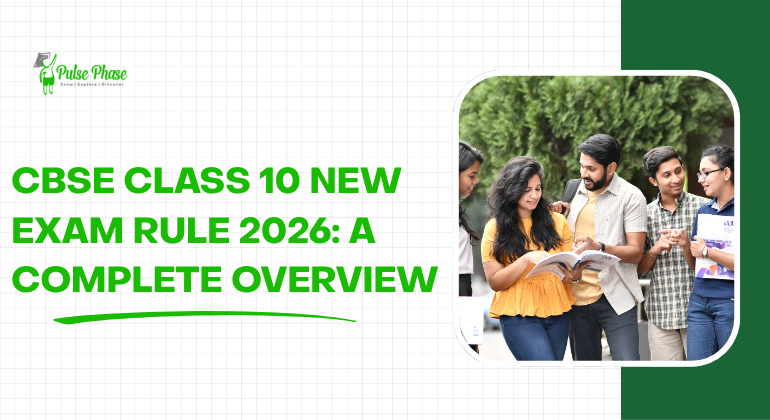Class 10 is one of the most important phases in the life of a student. It’s the perfect time where the transition to future education take place. This is also the time when the pressure to perform well, pick the right courses, and establish a solid foundation for further education starts. CBSE class 10th board exams give students exposure to a national-level exam. Understanding the CBSE Class 10 Exam Rules 2026 is essential to stay updated and prepare effectively for the changing academic landscape. (#CBSE #BoardExams #Class10)
Over 20 lakh students appeared in the CBSE 10th board exams in 2025. Schools, teachers, and parents take a lot of effort to help students perform well on class 10 board exams. Students who score well in the 10th exam are able to choose the stream of their choice for 11th.
To reduce stress and exam pressure, the Central Board of Secondary Education has taken a wide range of steps in the last couple of years. The main focus of CBSE is not on marks but on skills, concepts, etc. CBSE has made a lot of efforts in recent times to make class 10 a stress-free experience for class 10th students. In this article, we will discuss some of the major recent changes made by the Central Board of Secondary Education regarding the CBSE Class 10 Exam Rules 2026 policy. (#CBSE2026 #Class10NewPattern #ExamPreparation2026)
Recent Changes Made by CBSE for the Academic Year 2025-26
Some of the major changes in the CBSE Class 10 Exam Rules 2026 for the academic year 2025-26 are as follows:
1. Two exams a year
CBSE will offer two board exams per year, starting in 2026.
- First in February-March: Mandatory for all students.
- Second in May: The second exam in May is optional. Students can improve up to three subjects.
- Better score counts: Only the best marks will go on the final mark sheet.
This recent change made by CBSE is an important change as it gives students a second chance. It also helps class 10 students reduce stress from one big exam failure. Students who were sick or missed the first exam can appear for the second exam in May. To further eliminate the ‘high stakes’ aspect of Board Exams, all students will be allowed to take the Board Exams on up to two occasions during any given school year, one main examination and one for improvement, if desired.
Exam Attempts and Options
| Attempt | Month | Mandatory/Optional | Maximum Subjects allowed | Results Considered |
| First | February | Mandatory | All Subjects | Best of Two |
| Second | May | Optional | Upto 3 Subjects | Best of Two |
Comparison of Exam Format (Old vs New)
| Feature | Old System | New System |
| Exam sessions | One per year | Two per year |
| Retake Chance | Only for dropouts | Optional retake for 3 subjects |
| Score considered | Single result | Best score from both exams |
| Result Date | Once a year | Twice a year (April and June) |
2. Syllabus reduced by 15%
One of the other major recent changes made by CBSE is the reduction in the class 10 syllabus. CBSE has reduced the syllabus for Class 10 by approximately 15%. The CBSE introduced this change to help students understand important concepts more effectively and dedicate more time to skill development.
3. Skill-based learning
One of the major changes made by the CBSE is skill-based questions.
- Around 50% of the questions will be competency-based. This includes MCQs, case studies, and real-life situations.
- Only 30% or less will be long-form, descriptive questions. This change is made to reduce memory-based testing.
- Fewer long answers, more application-based questions to teach thinking skills in students.
| Feature | Old System | New System |
| Syllabus | Fully textbook content | 15% less content |
| Question Style | Mostly long answers | 50% skill- based questions |
| Long answer weight | High | Reduced emphasis |
4. Internal Assessment and Grading Changes
The Central Board of Secondary Education has shifted the focus from board exams to internal assessments, giving them greater importance under the new system.
. Internal work, including assignments, projects, lab work, tests, etc., now counts for 40% of the total marks.
- The old 5-point grading system is replaced by a new 9-point grading scale.
CBSE added new subject choices like Computer Applications, IT, and AI to meet modern learning needs.
CBSE schools will also run practicals and internal assessments once before the February exam. These scores will count for both exams.
Pros and Cons of the CBSE Class 10 New Exam Rule 2026:
| Advantage | Challenge |
| Extra chance to improve performance | More exams may strain students and teachers |
| Extra planning is needed for conducting second exam | Extra planning is needed for conducting the second exam |
| Focus on skills over memorizing | Scheduling more exams can be complex |
| Encourages steady learning | More workload for teachers |
How should students prepare for the CBSE Class 10 Exam Rules?
Below are some preparation tips that a class 10 student can use to prepare well for the changes made by the board.
- Students need to time their studies, knowing there will be a chance for two exams.
- Focus more on class tests and projects, as internal assessments have more significance.
- Practice MCQs and case-based questions more.
- Review the core syllabus thoroughly.
Comparison of Old Policies and CBSE Class 10 Exam Rules 2026
| Area | Old | New |
| Exam frequency | One exam a year | Two exams a year |
| Syllabus | Full NCERT syllabus | 15% reduced syllabus |
| Question Types | Mostly short/long answers | 50% skill based questions |
| Internal assessment | 20-30% | 40% |
| Grading scale | 5-point system | 9-point grading |
| Subject exams scheduling | Random | Grouped by subject type |
( CBSE board exam rules, CBSE 2026 class 10 pattern, Class 10 exam format, CBSE new exam guidelines, CBSE exam rule changes, Revised exam pattern CBSE, Class 10 2026 changes, CBSE board assessment criteria, Class 10 exam marking scheme, CBSE curriculum updates 2026)
Conclusion ( CBSE Class 10 Exam Rules)
The CBSE is one of the most trusted school boards in India. Every year, lakhs of students appear for CBSE class 10 exams in the country with an aim to build a stronger future. Recent changes made by the Central Board of Secondary Education are a big step towards making education less stressful and more meaningful. Students can try to improve their marks in up to three subjects: science, maths, social science, and languages. Reduction of the syllabus and increasing skill-based questions can help students encourage deep learning. These changes are made by CBSE as per the NEP 2020. It aims to build a strong education system. While these changes may take some time to adjust to, they will definitely help class 10 students in the long run. (BoardExamUpdate, CBSEChanges2026, Class10NewPattern)
READ MORE ABOUT:

